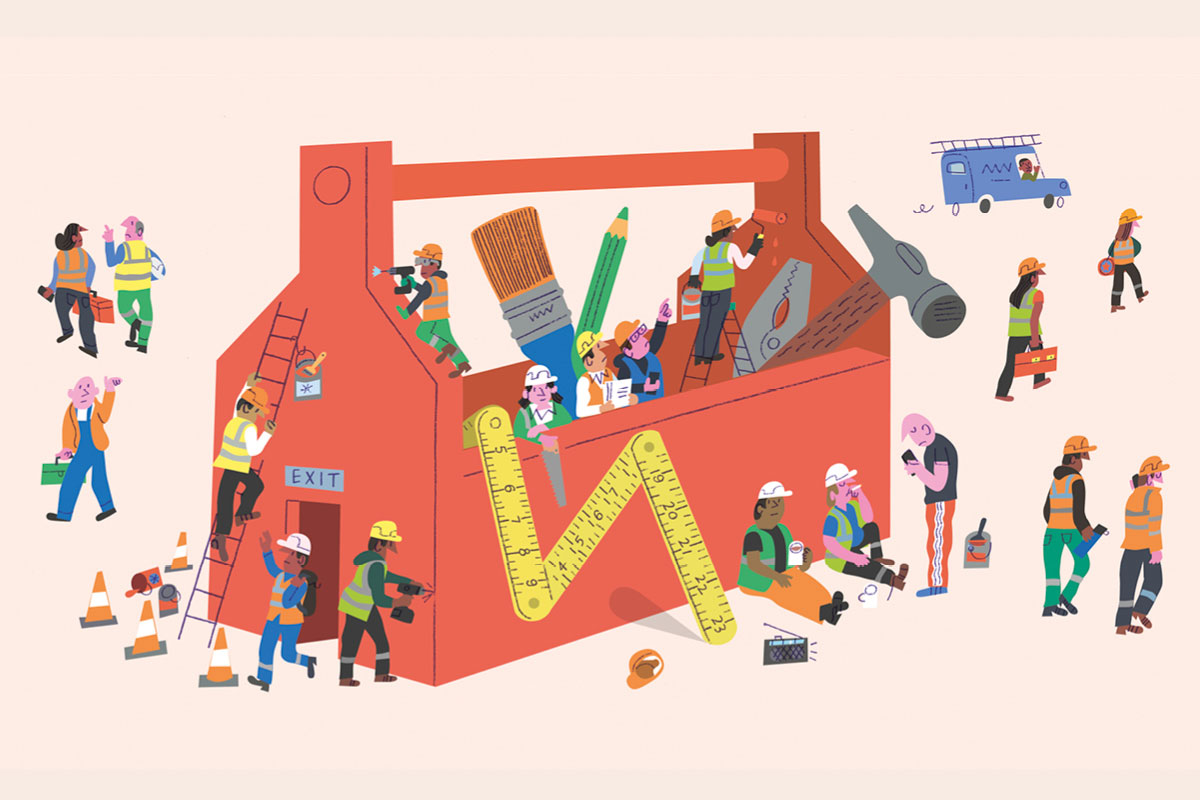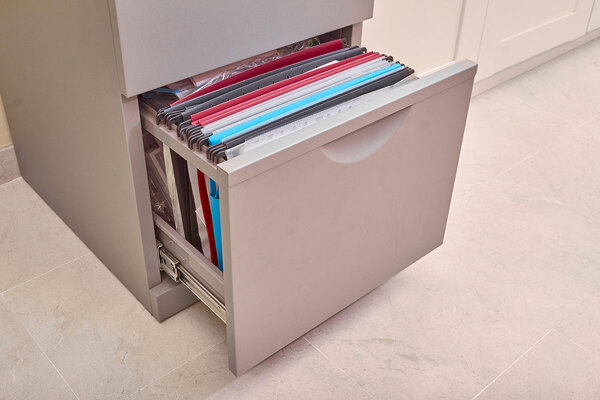How will social landlords meet their repairs challenge?
Staff shortages, meeting net zero and mounting repairs backlogs are just three examples of the asset management challenges faced by landlords. Jack Simpson talks solutions with Direct Works. Illustration by Peter Allen
The past two years have seen the issue of repairs and maintenance shoot up social landlords’ priority list. After a number of years in which development, and hitting the government’s 300,000-homes-a-year target, seemed to be the major focus driving sector discourse, there has been a shift.
With a perfect storm of ageing stock that needs to be upgraded, fire safety issues that need to be fixed and net zero targets that need to be met, social landlords are having to focus – and spend money – on existing stock.
But it is not the easiest operating environment. Repairs teams face a deepening skills crisis, surging material prices and huge repairs backlogs. This all means repairs teams are having to think on their feet.
Inside Housing thought it would be a good time to speak to those on the frontline, who are trying to navigate these mounting challenges. We spent an hour with 11 of Direct Works’ most senior members to discuss the biggest repairs and maintenance issues and how the sector can overcome them.
Direct Works has been running for 21 years and aims to bring together those associations with direct labour repairs services – in other words in-house repairs teams. They share best practice and lobby for change in the sector. Direct Works currently has around 130 local authority and housing association members, which are responsible for the repairs and maintenance of around 2.5 million social homes. And it appears that in-house repairs teams are back in fashion for landlords.
“I think at the moment it’s all about insourcing and taking back that control,” explains Mike Wilson, treasurer and secretary at Direct Works and consultant at Tristar Consulting. “I think you can foster relationships better with your residents and also particularly post-pandemic, it is quite hard to find good external contractors and people are keen to have their own internal workforce.”
Every part of the economy has been affected by COVID-19, but repairs teams have been impacted more than most. These teams have not been able to work from home and have had to continue to serve residents, at high risk, throughout the lockdowns.
Despite the majority of organisations continuing emergency works during lockdowns, the less urgent work was not always permitted, and inevitably a backlog of repairs work built up.
“I think all of us in the sector would really cringe if we thought any of our customers were left in those situations. We would be very embarrassed”
“It’s been a bit like driving on a motorway for the last two years,” says Jonathan Fletcher, assistant director of operations for responsive repairs and voids at Karbon Homes. “You’ve been hitting congestion [in the form of a lockdown], and then that starts building up in the form of a works backlog.”
This has forced organisations to be more creative and innovative in the way they approach repairs and reduce workload.
Jo Whittall, vice-chair at Direct Works and executive director of property services at Clúid Housing in the Republic of Ireland, says that his organisation reduced the number of gas servicing checks it did during the pandemic. In the Republic of Ireland, yearly gas checks are considered best practice but are not a legal requirement like they are in the UK.
“We were able to carry out a risk assessment on the likelihood of death due to not servicing a boiler, against the likelihood of causing a death through COVID-19,” he explains. “We presented that in a report to the board and they agreed that we shouldn’t do any gas servicing for 12 months.”
He says there were no adverse events as a result of the change, and, crucially, it prevented around 5,000 visits to homes during the height of the pandemic.
Focus on disrepair
Stacey Baldwin, head of scheduling and logistics at Places for People, says that the landlord implemented a new triaging process in response to the pandemic, and carried out some repairs remotely.
Places for People, which manages homes from Aberdeen in north-east Scotland to Truro in Cornwall, also reviewed where its operatives are based, where its services can be used and where it can outsource services. Ms Baldwin says the association is now adopting a hybrid model where it outsources work in its outlying areas and develops in-house skills in areas of high demand for certain services.
“I think as professionals we have always tried to do right by customers and we welcome the [social housing] white paper and ombudsman report”
Steve Kirk, director of maintenance operations at Citizen Housing, points out that the COVID-19 pandemic is not over. Just after Christmas, 80 of his 450 team members were off work as a result of the virus.
But 2021 was not only a year dominated by the pandemic. Housing disrepair was brought under the microscope, with a high-profile investigation by ITV News revealing squalid conditions that some social housing tenants are living in.
“I think all of us in the sector would really cringe if we thought any of our customers were left in those situations. We would be very embarrassed,” says Phil Pemberton, director of asset strategy and delivery at Riverside. However, he says he feels that quite a few of those issues were linked to regeneration.
This media pressure is being supported by increasing regulatory pressure. The new beefed-up Housing Ombudsman is far more proactive, with an increased headcount and a more enthusiastic approach in naming and shaming under-performing landlords. Mr Pemberton points to the ombudsman’s report on damp and mould as something that has given the sector a “real focus”.
Meanwhile, the Social Housing Bill will once again task the Regulator of Social Housing with assessing landlords’ performance on consumer standards. These new standards will include performance on disrepair and responding to tenant complaints.
Russell Thompson, chair of Direct Works and managing director of places management at Places for People, says: “I think as professionals we have always tried to do right by customers and we welcome the [social housing] white paper and ombudsman report.”
“Even now I have 15 vacancies that I’m struggling to fill”
Nevertheless, he does point out that this occurred against a context of cost constraints. “The constraints we’ve got are on our finances,” he explains. “Balances need to be struck between asset management investment and development, and we are all trying to balance those things to maximise what we can, really.”
Repairs services are also facing material cost pinches, with a rapid rise in product prices in the past 18 months having a huge impact on all those on the panel.
This has been felt by Paul Longman, head of major projects at South Essex Homes, which is currently refurbishing three tower blocks. “On this project we are dealing with a 25% price increase at the moment,” he says.
It is not just about the availability of materials. There are also not enough people to carry out the works that need doing now, let alone to meet future expectations.
Mr Kirk says he was given £2m by his board to recruit after the first lockdown, as a way to increase headcount to clear the repairs backlog. “I struggled to spend it – I just couldn’t find the people. Even now I have 15 vacancies that I’m struggling to fill,” he says.
And increasing numbers are leaving the sector. Mr Longman says that the average age of surveyor he uses is 55, and just last month he had one 73-year-old retiree, with another 73-year-old set to retire next year.
The skills shortage is having an impact on the quality of work, too.
“A lot of my work is around compliance and particularly fire, and some of the [fire risk assessments] that I see are absolutely appalling,” says Richard Hazard, repairs consultant at RH Asset Management Consultancy. “I’m of the view that we should try and train people in house and bring them through, and that’s what we are trying to do but it’s a big ask.”
And this skills crisis is taking its toll even before you factor in the massive retrofit challenge the sector faces to get the UK’s social housing stock to Energy Performance Certificate Band C by 2030 and to net zero by 2050.
“We are still in the discovery phase on retrofit,” Mr Thompson says. The work promises to be vast, with hundreds of properties needing to be worked on a week if the sector is going to make its 4.3 million social housing properties net zero by the 2050 deadline.
Mr Thompson says that the funding will be a big challenge, not only in securing the money, but also in ensuring that housing associations’ business models are set up to factor in the net zero challenge.
With an ever-increasing number of items on asset management teams’ to-do lists, and a shrinking pool of talent to carry out these tasks, the sector is going to have to think creatively about how it can achieve them.
Whether the sector can fully rise to the challenge and meet these demands remains to be seen. But one thing is for sure: there are going to be some busy repairs and maintenance teams up and down the country.
Sign up for our asset management newsletter
Already have an account? Click here to manage your newsletters











